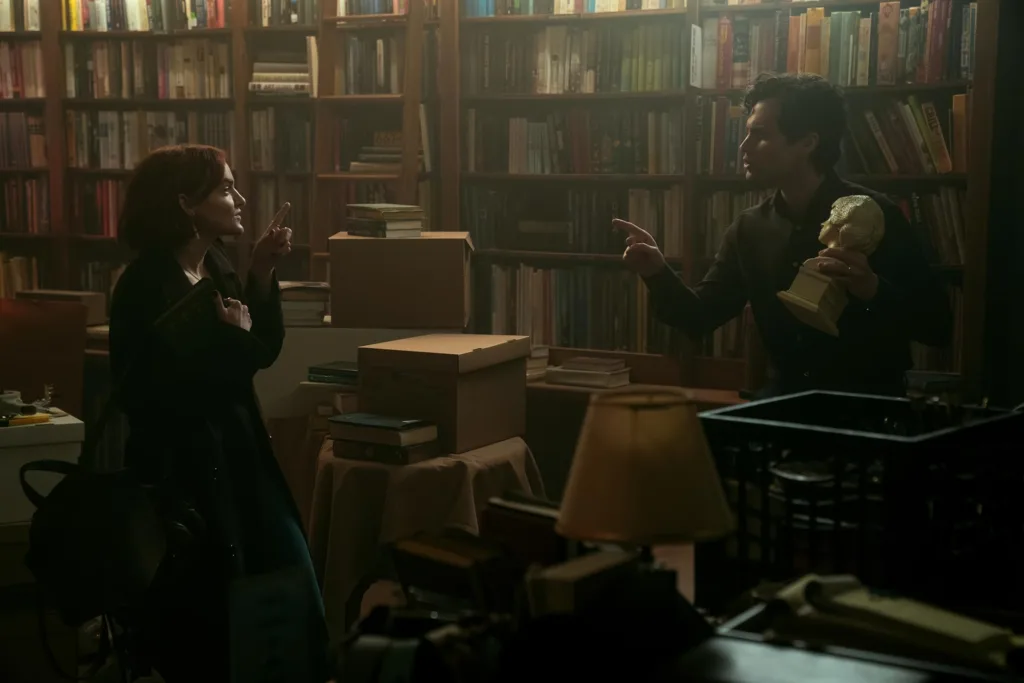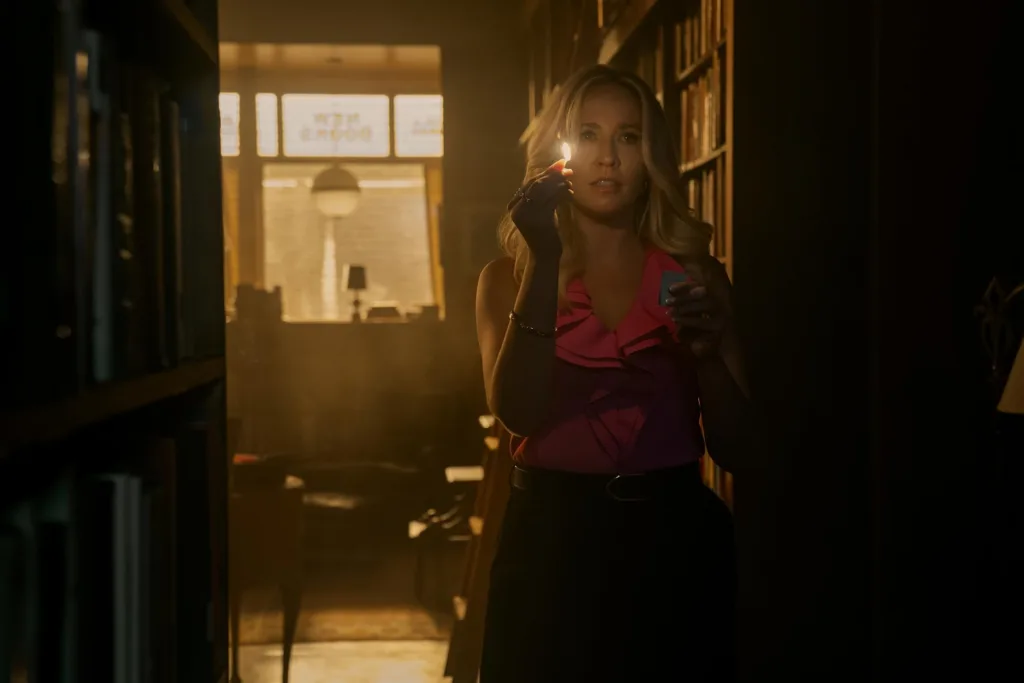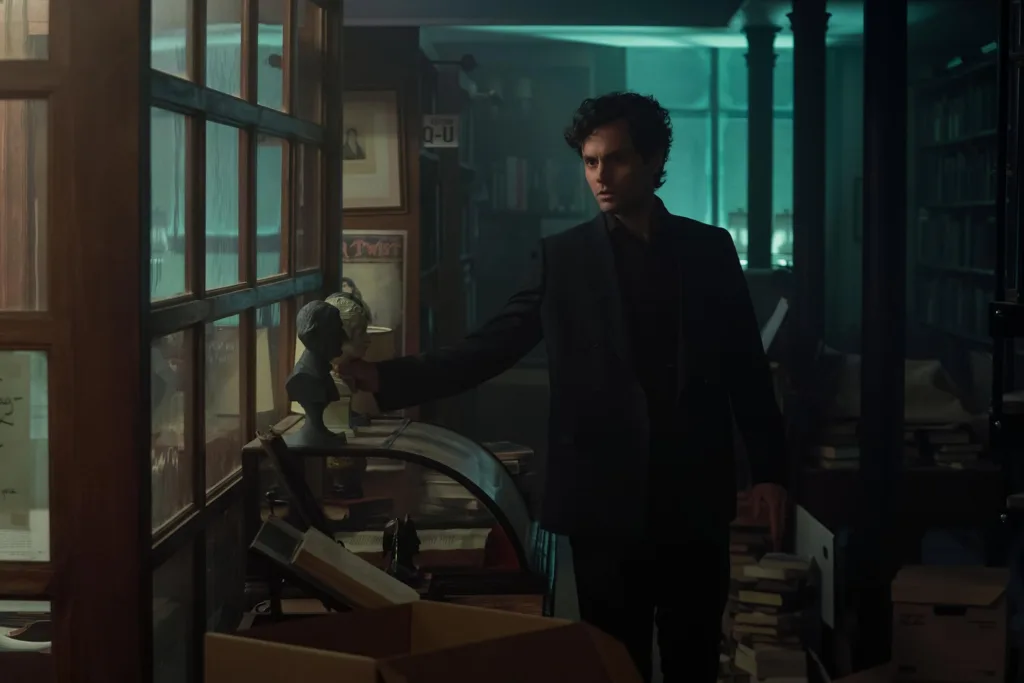Since its 2018 debut, You has upended the classic romantic thriller by casting a serial predator as its leading man—and then daring us to sympathize with him. What began in Season 1 as a razor-sharp critique of stalking culture, set against Manhattan’s literary underworld, soon ballooned into a globe-trotting spectacle.
New York gave way to Los Angeles’s sun-bleached façades, then London’s polished elites, each pivot exposing the show’s fascination with how status and technology enable toxic entitlement. With every identity shift—from Will Bettelheim to Jonathan Moore to Rhys Montrose—Joe Goldberg’s chameleon transformations mirrored our streaming era’s appetite for reinvention, where location and persona blur under algorithmic influences.
Three years on, Season 5 reintroduces Joe as a bona fide celebrity husband in New York, complete with tabloids, talk-show appearances, and charity events. His marriage to Kate Lockwood and the return of his son, Henry, positions him squarely in the public eye—yet the series never lets us forget the glass prison beneath Mooney’s bookstore, a chilling symbol of voyeuristic culture and patriarchal violence.
By juxtaposing Joe’s polished veneer with his private tyranny, You probes the dissonance between curated online identities and real-world harm, signaling a wider trend in streaming dramas that foreground social justice themes even within pulse-pounding thrillers.
Power Plays and Private Cages: Season 5’s Narrative Blueprint
Season 5 opens by planting Joe and Kate atop New York’s social pyramid, where every red-carpet smile masks a latent threat. Flashbulbs capture their “power couple” image—Kate’s charitable initiatives lauded in glossy magazines, Joe’s dapper persona echoing on late-night talk shows.
Henry’s homecoming adds a veneer of family-friendly stability, even as the Lockwood boardroom simmers. Inside that gilded world, half-siblings Reagan and Maddie circle Kate like wolves in couture, each vying for corporate dominion. This sibling rivalry, equal parts Shakespearean farce and reality-TV melodrama, underscores how wealth can fracture a family and fuel ambition without restraint.
A corporate calamity—an exposé on Lockwood oil pipelines—soon fractures the façade. Joe, ever the self-appointed guardian, slides from devoted husband to clandestine executioner. His justification slips into a darkly comic self-righteous monologue: murder becomes “cleansing” in a world rife with corruption. That tension between suburban normalcy and vigilante impulses mirrors ongoing cultural debates about who wields power behind closed doors.
Then arrives Bronte, the season’s literary siren. A fledgling playwright with an Ibsen fixation, she breezes into Mooney’s bookstore and within minutes reignites Joe’s obsession cycle. Their exchanges brim with ironic critiques of toxic masculinity, even as Joe’s fixation erodes any pretense of reform. Here, the series leverages its own history—referring to Guinevere Beck in a sly nod to long-time viewers—while using Bronte as a lens to examine agency and complicity in abusive relationships.
As the plot spirals, corporate intrigue and psychological horror collide. Boardroom scheming unfolds alongside clandestine stakeouts in the basement “torture cage.” Teddy’s steady presence offers a fleeting counterpoint to his sisters’ venom, yet every character operates within a system stacked against honest reckoning. Cameos from past seasons slip in like Easter eggs, reminding us that Joe’s past is never truly buried.
Midseason reveals pivot allegiances: secrets in Kate’s past, Bronte’s hidden motives, and Reagan’s darkest gambit. Joe is forced to confront his own mythology—hero or villain? In the finale’s final act, corporate betrayals and romantic entanglements untangle just enough to deliver a twist that flips the gaze back onto us, the audience. Open threads linger—legal fallout, surviving alliances—hinting at a world that outlives its serial killer.
Portraits in Ambiguity: The Cast That Defines Season 5
Joe Goldberg (Penn Badgley) remains television’s most uncomfortable antihero—his effortless charm masking relentless menace. Badgley plays him with seductive ease, inviting us into Joe’s twisted logic even as we recoil from it. That charisma-versus-cruelty tension speaks to a broader cultural fascination with flawed masculinity, and the series exploits our empathy to interrogate how media can romanticize violence under the guise of “love.”
Over five seasons Joe has morphed from shadowy bookstore stalker into a glossy public figure. Now a celebrity husband, he navigates cameras and charity galas with the same poise he uses to dispatch victims—only the stakes have changed. The familiar voice-over that threads each episode sometimes feels like an indispensable narrative guide, yet at others, it becomes a crutch—reminding us how the show relies on Joe’s self-mythologizing even as it tries to undermine it.
Charlotte Ritchie’s Kate Lockwood strides a precarious line between moral arbiter and enabler. As heiress-turned-beleaguered CEO, she wields corporate power to shield Joe’s darkest impulses. Ritchie captures Kate’s growing ambivalence—her philanthropic veneer cracking under the weight of family scandal. In a landscape still wrestling with women’s leadership roles, Kate’s complicity in cover-ups offers a sober reflection on how privilege can commit its own violences.
Madeline Brewer’s Bronte arrives as the season’s “final girl,” a trope reclaimed through her wit and intellect. Her Ibsen-infused worldview sets up a meta-dialogue about womanhood and agency—yet she harbors secrets that challenge simplistic notions of victimhood. Brewer’s chemistry with Badgley reignites Joe’s obsession, and in their scenes the show lays bare how narratives of consent and complicity can be written in the margins rather than declared outright.
Anna Camp’s dual turn as Reagan and Maddie skewers the ultra-rich with gleeful satire: one sister’s venomous ambition contrasts sharply with the other’s dizzy naiveté. Meanwhile, Teddy (Griffin Matthews) and Harrison (Pete Ploszek) serve as both audience surrogates and cautionary foils, illustrating how privilege often masks personal integrity.
Finally, young Henry (Frankie DeMaio) embodies Joe’s battered paternal instincts, a reminder that even a child isn’t safe from media’s obsession with charismatic monsters. Cameos from earlier seasons drop in like nostalgic seasoning—sometimes enriching the narrative, sometimes teetering on fan service—underscoring how You can’t escape the gravitational pull of its own history.
Satire in a Glass Cage: Power, Violence, and the Viewer’s Reflection
Season 5 of You turns its microscope on obsession and control, exploring how stalking can be dressed up as seductive romance—or satirical critique—depending on the script’s wink. Joe’s fixation on each new “you” teeters between sarcastic self-awareness and outright glamorization of violence. Streaming platforms have shown a hunger for antiheroes who blur moral lines, and here, the series plays with that appetite: one moment it mocks “nice guy” culture and online incel bravado, the next it flirts with making Joe’s justifications almost palatable.
At the same time, the show skewers power and privilege with gleeful irony. Kate’s Lockwood fortune isn’t just window dressing; it becomes a battleground for billion-dollar philanthropy gone off the rails. In one scene we’re enveloped by the cozy warmth of Mooney’s indie bookstore, then bam—plunged into the sterile chill of corporate boardrooms. That contrast highlights a growing television trend: using physical spaces to signal class critique, where a single set can embody the divide between grassroots community and oligarchic excess.
The second-person narration remains the series’ boldest innovation, implicating us as co-conspirators in Joe’s crimes. By directly addressing “you,” the show taps into a meta discourse about viewer responsibility: are we meant to experience catharsis or frustration, moral outrage or guilty thrill? This duality mirrors broader debates in media studies about whether complex protagonists challenge social norms or simply reinforce them.
Finally, Joe’s pursuit of redemption limps along like a clumsy afterthought. His attempts at atonement feel performative—an echo of public apologies that flood social media feeds without real reparations. When justice finally arrives in the finale, it lands with a hollow echo: the narrative reckoning acknowledges his crimes, but does it truly rewrite the story we’ve watched unfold?
Crafting Atmosphere: Direction, Cinematography & Sound
Season 5’s return to New York feels less like a mere location shift and more like a character reawakening. The skyline’s angular silhouettes and rain-slicked streets are captured in rich, moody palettes that contrast sharply with the sun-drenched gloss of Los Angeles and the polished austerity of London.
Inside Mooney’s bookstore, warm amber lighting and narrow aisles evoke a comforting intimacy—until the camera plunges into the sterile minimalism of the Lockwood penthouse or the cold chrome of corporate boardrooms, underlining the show’s class tensions without a single line of dialogue.
Visually, director Sam Pasternack leans into tension with precise framing: Joe’s silhouette framed in doorways, Gill Sans–inspired typography on screen, and rapid-cut montages during his killings. These sequences borrow from slasher conventions while never losing sight of You’s satirical edge. Episode beats follow a deliberate rhythm—midseason twists arrive like sudden drum hits, whereas the finale unfolds with the unhurried gravitas of a feature-length thriller.
Sound design amplifies every narrative turn. A Taylor Swift ballad might bloom as Joe’s obsession rekindles, its sweetness undercut by the dissonant scrape of bone-chilling score notes. Voice-over narration floats above diegetic soundscapes, alternately guiding and mocking us, a reminder that in You, what we hear can be just as deceptive as what we see.
Final Act & Enduring Echoes of Joe Goldberg
Season 5 circles back to the claustrophobic tension of Season 1, reviving Mooney’s bookstore and basement cage while layering in corporate boardroom drama. Those early chapters felt lean and urgent; here, familiar motifs return with fresh stakes—Joe as celebrity husband, Kate under siege, Bronte looming as the final obsession. Strategic callbacks—Beck’s name dropped in sly asides, a wink to the glass box’s original horrors—often land as clever nods. Yet at moments the fan service drifts toward padding, risking the line between homage and hollow pandering.
When the finale unfurls, viewers wrestle with real deliverance for each main player. Joe’s reckoning teeters between poetic justice and televised spectacle. Kate and Bronte each face their own reckonings, charting arcs from enablers or victims to figures with reclaimed agency. Henry’s presence underscores how Joe’s worst impulses cast long shadows over any hope for normalcy. That last shot, Joe breaking the fourth wall, pulses with irony—his confession loops back on us, leaving a sting that lingers beyond the credits.
Across five seasons, Joe has flipped from anonymous clerk to unmasked celebrity psychopath. His voice-over narrative, once a stark device, now feels inseparable from the show’s identity—and occasionally a weight that slows the momentum. Supporting players have grown or stalled in turn: some twists deepen their roles, others feel shoehorned. These uneven turns reflect how long-running streaming hits can struggle to maintain focus under binge-driven expectations.
Loose threads remain—legal fallout for the Lockwoods, Bronte’s next move, the fate of Mooney’s legacy—that could seed a spin-off or limited event. At its most provocative, You has held up a mirror to true-crime culture’s hunger for captivating villains. Whether future shows will borrow its blend of satire and suspense, or chart a different course, remains an open question.
The Review
'You' Season 5
Season 5 brings the series home with its trademark dark wit and social satire, anchored by Penn Badgley’s magnetic turn and sharp explorations of power, privilege, and obsession. While callbacks and boardroom intrigues energize its final chapters, pacing dips and heavy fan service occasionally blunt its impact. Still, this last journey through Mooney’s bookstore and elite corridors offers a thought-provoking glimpse at our fascination with charming monsters.
PROS
- Penn Badgley delivers a chilling, charismatic performance.
- Sharp satire of privilege and media spectacle.
- Thoughtful use of New York as a living, thematic backdrop.
- Bronte’s character adds fresh psychological depth.
- Voice-over device keeps the audience complicit and engaged.
CONS
- Pacing lags amid excessive callbacks and fan service.
- Corporate drama sometimes overshadows core thriller elements.
- Kate’s subplot feels unevenly developed.
- Final redemption arc for Joe can feel superficial.




















































